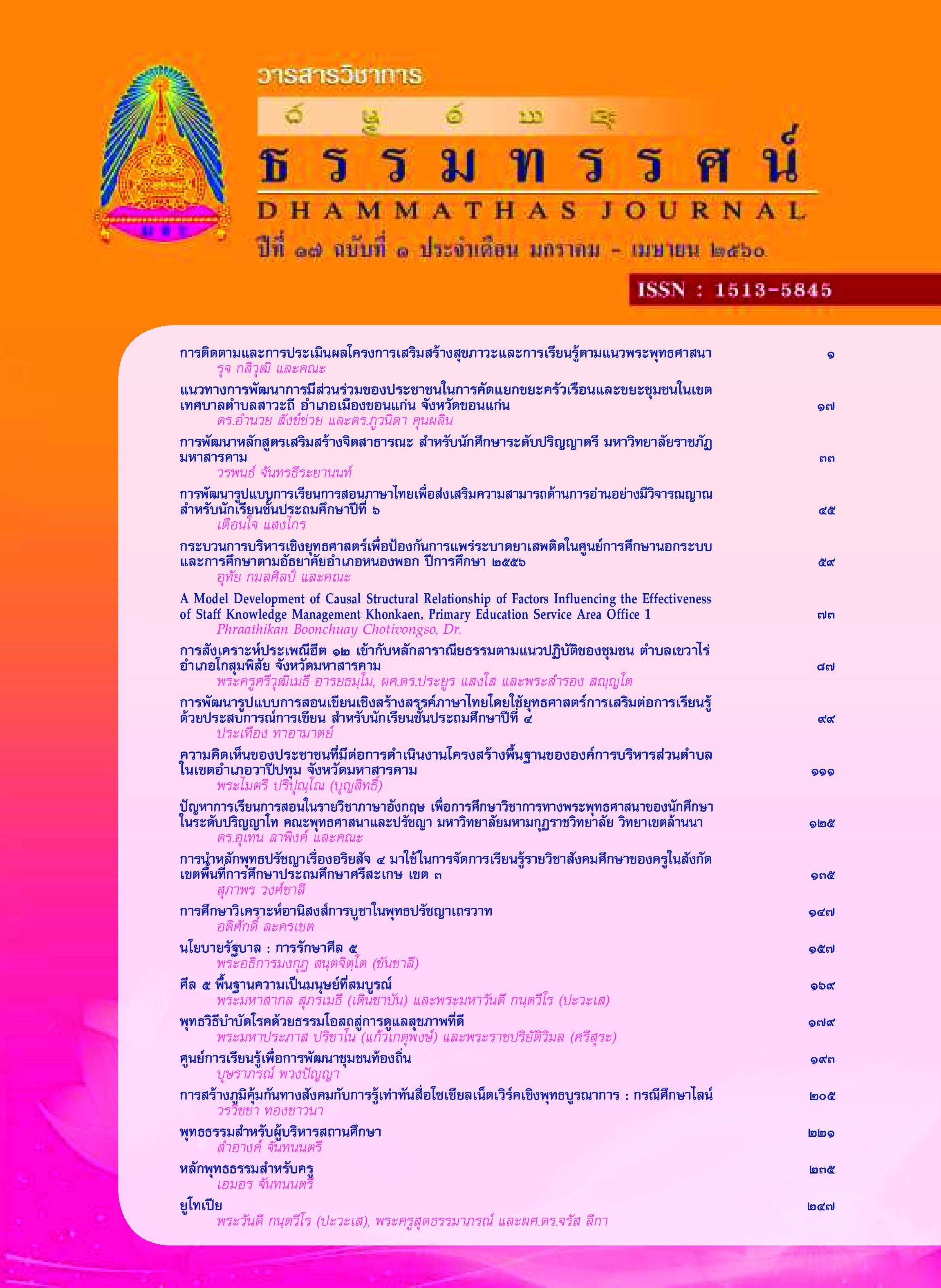พุทธธรรมสำหรับผู้บริหารสถานศึกษา
Main Article Content
Abstract
บทคัดย่อ
หลักพุทธธรรมที่สอดคลองกับหลักการบริหารสถานศึกษาประกอบด้วย ๑) หลักสัปปุริสธรรม ๗ ว่าด้วยการครองตน เป็นธรรมของสัปปุริสชน คือคนดี ประกอบด้วย รูหลักการ รูจุดหมาย รูตน รูประมาณ รูกาล รูชุมชน และรูบุคคล ๒) หลักสังคหวัตถุ ๔ ว่าด้วยการครองคน เป็นธรรมยึดเหนี่ยวใจบุคคลและประสานหมู่ชนให้สามัคคี ประกอบดวย ทาน คือ การให้ ปยวาจา คือ วาจาอันเป็นที่รัก อัตถจริยา คือ การประพฤติประโยชนและสมานัตตา คือ ความมีตนเสมอหรือทำตนเสมอต้นเสมอปลาย และ ๓) หลักอิทธิบาท ๔ ว่าด้วยการครองงาน เป็นคุณธรรมที่นำไปสู่ความสำเร็จแห่งผลที่มุ่งหมาย ประกอบด้วย ฉันทะ คือ ความพอใจ วิริยะ คือ ความเพียร จิตตะ คือ ความคิดมุ่งไปและวิมังสา คือความไตรตรอง ซึ่งผู้บริหารสถานศึกษาควรยึดหลักธรรมทั้ง ๓ นี้เพื่อนำไปประยุกต์ใช้กับการบริหารงานของสถานศึกษา หลักพุทธธรรมทั้ง ๓ เป็นหลักธรรมที่จะช่วยให้ผู้บริหารประสบความสำเร็จ เพราะการรู้จักตน รู้จักคน จะทำให้ได้บริวาร การรู้จักงาน จะทำให้ได้ผลสัมฤทธิ์ สำเร็จตามเป้าหมายและไดรับความพึงพอใจทั้งผู้บริหารและคณะบุคคลที่เกี่ยวข้องกับการบริหารงานของสถานศึกษา
Abstract
The Buddhist Doctrines those are relevant to the principles of school management include three dimensions. 1) Sappurisa-dhamma 7, related to self-managing, are virtues of a gentleman; qualities of a good man, consist of knowing the law, knowing the purpose, knowing oneself, knowing how to be temperate, knowing the proper time, knowing the society, and knowing the individual. 2) Sangahavatthu 4, related to people-managing, are virtues making for group integration and leadership consist of Dana: giving, Piyavaca: kindly speech, Atthacariya: useful conduct, and Samanattata: even and equal treatment. And 3) Iddhipada 4, related to task-managing, are path of accomplishment consist of Chanda: will, Viriya: effort, Citta: active thought, and Vimamsa: investigation. The principal should apply the three Buddhist doctrines to school administration.
The three Buddhist doctrines could be applicable by the principal to acquire an accomplishment. Self-managing and people-managing, therefore, could support making
followers. Task-managing could support achieving the goal, as well as, could make both
principal and stakeholders satisfied with school administration.

